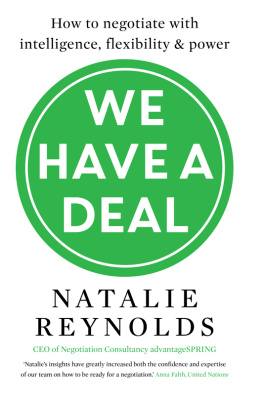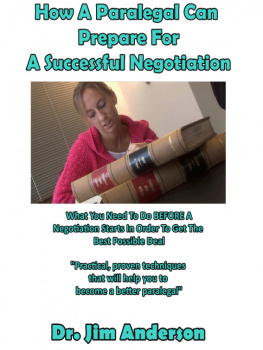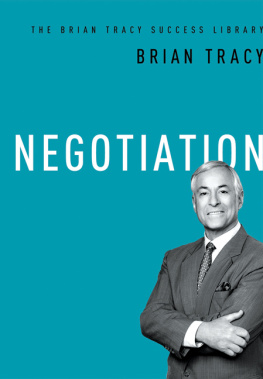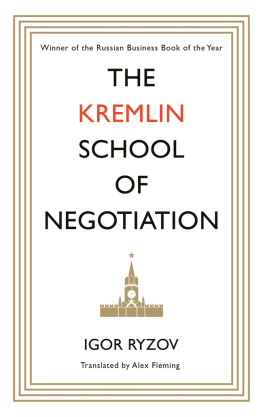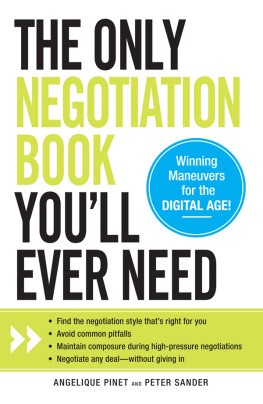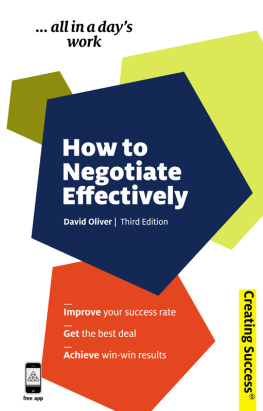

WE HAVE A DEAL
How to negotiate with intelligence, flexibility & power
WE HAVE A DEAL
NATALIE REYNOLDS
CEO of Negotation Consultancy advantagesSPRING

This book is for Leo. The most fearless, wily and persistent negotiator I know .
Published in the UK in 2016 by
Icon Books Ltd, Omnibus Business Centre,
3941 North Road, London N7 9DP
email:
www.iconbooks.com
Sold in the UK, Europe and Asia by
Faber & Faber Ltd, Bloomsbury House,
7477 Great Russell Street,
London WC1B 3DA or their agents
Distributed in the UK, Europe and Asia by
TBS Ltd, TBS Distribution Centre, Colchester Road,
Frating Green, Colchester CO7 7DW
Distributed in the USA by
Publishers Group West,
1700 Fourth Street, Berkeley, CA 94710
Distributed in Australia and New Zealand by
Allen & Unwin Pty Ltd,
PO Box 8500, 83 Alexander Street,
Crows Nest, NSW 2065
Distributed in South Africa by
Jonathan Ball, Office B4, The District,
41 Sir Lowry Road, Woodstock 7925
Distributed in India by Penguin Books India,
7th Floor, Infinity Tower C, DLF Cyber City,
Gurgaon 122002, Haryana
Distributed in Canada by Publishers Group Canada,
76 Stafford Street, Unit 300
Toronto, Ontario M6J 2S1
ISBN: 978-178578-032-5
Text copyright 2016 Natalie Reynolds
The author has asserted her moral rights
No part of this book may be reproduced in any form, or by any means, without prior permission in writing from the publisher
Typeset in Sentinel by Marie Doherty
Printed and bound in the UK by Clays Ltd, St Ives plc
Contents
Introduction
T his isnt like most negotiation books. Yes, we will talk about theory and process, but thats only a small part of what this book is all about. This book is designed to demystify negotiation and to teach you how to negotiate with intelligence, flexibility and power.
It doesnt matter who you are or what your background is. This is a book for anybody who negotiates. And so thats everyone. Negotiation is the most important skill in business, and in life, to get what you want, need or deserve. Are you doing what you can to get the best deal, every time?
From an unspoken interaction in the street with a stranger as to who will go first through the revolving door, to a strained conversation with a family member about what you want to do at the weekend, to a haggle with a car dealer, to a mediated contract and pricing dispute we negotiate all the time. Its a social lubricant. Its what keeps societies functioning, marriages working, businesses operating and countries interacting. Negotiation matters and as human beings we have been doing it since the dawn of civilisation.
I want to show you that negotiation is not a mystical talent that requires extreme intellect, copious charm or buckets of experience (although those things can all be useful). The ability to negotiate is a skill that can be learned by anyone. Through identifying your strengths and weaknesses, learning the processes and mastering the tools, you can start to negotiate more effectively in all parts of your life.
And as with most things in life, practice makes perfect. I always think that it helps to view negotiation as being like a muscle. If you never flex or use that muscle, and you are then called on to run a marathon perhaps view the marathon as a salary negotiation in this context! then its going to be supremely painful and a shock to the system, as you wont be at all prepared. If, however, you have used that muscle just a little bit every day, when the time comes for the marathon (or salary negotiation), you will be that bit more prepared and far more able to cope, and it will be much less painful.
This book is designed to give everyone the knowledge, skills and insight they need to be a brilliant negotiator in all aspects of their life. Whether you are negotiating with your partner, the boss or a supplier on another continent, whether you are new to negotiation or a seasoned pro, this book will give you what you need to up your game and be the best negotiator you can be.
PART ONE Getting Started
CHAPTER ONE
Why Negotiation Matters
P eople negotiate all the time. We just dont always realise that we could be doing it, should be doing it, that we are doing it, or indeed how to do it well.
From the renegotiating of terms with a new client to the difficult conversation about missed performance targets with a supplier; from the request to your boss to have your role re-evaluated to the demanding of a lower monthly fee from your broadband provider, almost every interaction in which we are requesting something from someone else is a negotiation.
Some negotiations in life are more obvious than others. When my team works with delegates in our workshops, we will always ask them to imagine all the people they might negotiate with over the course of a day, week, month or year.
Lets start with the most obvious people who come to mind when you think of negotiation the people you work with most closely. What kinds of negotiation might you engage in with them ?
Colleagues: Who delivers the difficult message to the boss? Who does what work, gets what desk or pays for the coffee?
Boss: Youre likely to negotiate on a number of issues, from salary to promotion, job title, whos on your project team, time off and deadlines.
Suppliers, customers, partners or clients: You might negotiate about price, risk, volume, deadline, guarantees and performance indicators. These are what I would call obvious negotiations; you may even note them in your diary as 2pm negotiation with client.
But we negotiate in our personal lives too
Salespeople, estate agents and service providers: Outside of work you are likely to engage in negotiations with the suppliers of services or products to you or your family. Examples might include deliberations over the sale price of a new dining table with the furniture store salesperson, trying to agree a speedier completion date for a house sale with your real estate agent or seeking a lower tariff with your energy supplier in exchange for not moving to one of their competitors. Interestingly, many people wouldnt view buying furniture as an opportunity to negotiate, they would just pay the price on the ticket, whereas others will take great delight in trying to secure a discount, no matter how small. Similarly, some people will never really question the tariffs set by their energy companies and will simply sign up without really considering what could be changed or improved in the standard package.
Of course, a competitive and heavily populated market for energy supply should provide all of us with the incentive to push back and negotiate for better terms. Quite simply, if a provider says no, it is now easier than ever for us as consumers to find someone else who can provide what we are looking for. Similarly, I once ran a training programme at which one of the attendees was a sales director for a well-known high street furniture retailer. She explained that if a customer ever paid the ticket price for a product at their stores, the salespeople would think they were a fool. Why? Because the sales-people were mandated to offer an immediate 10 per cent discount if asked for one. If the customer demanded more, they would then reluctantly go to 12.5 per cent. If the customer still wanted more, they could speak to the manager who in most cases would reluctantly offer a further 5 per cent. In short, the discounts are often there to be had and are factored into the list price; you just have to ask for them.
Next page
